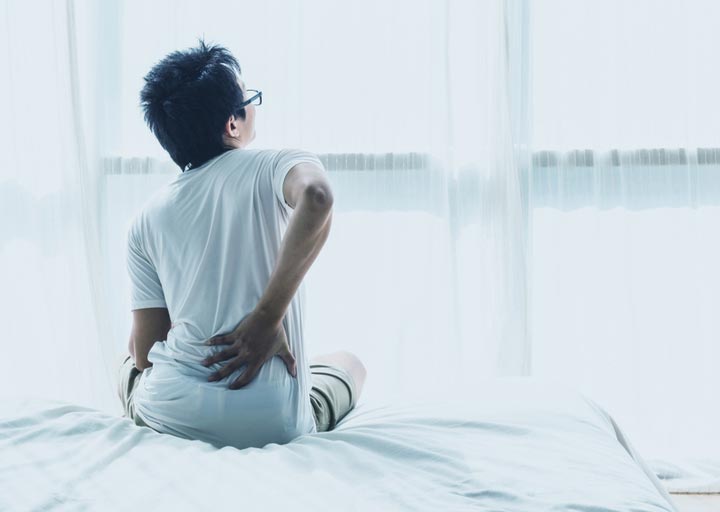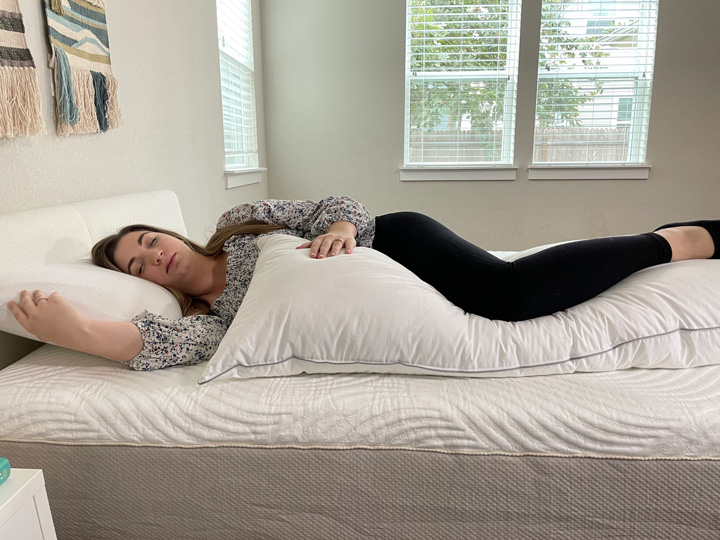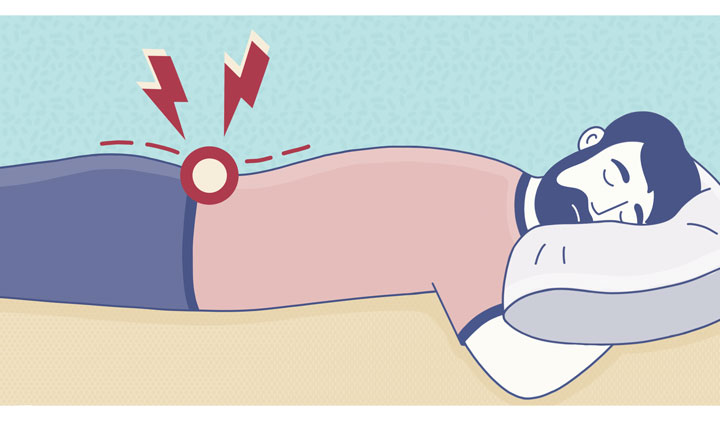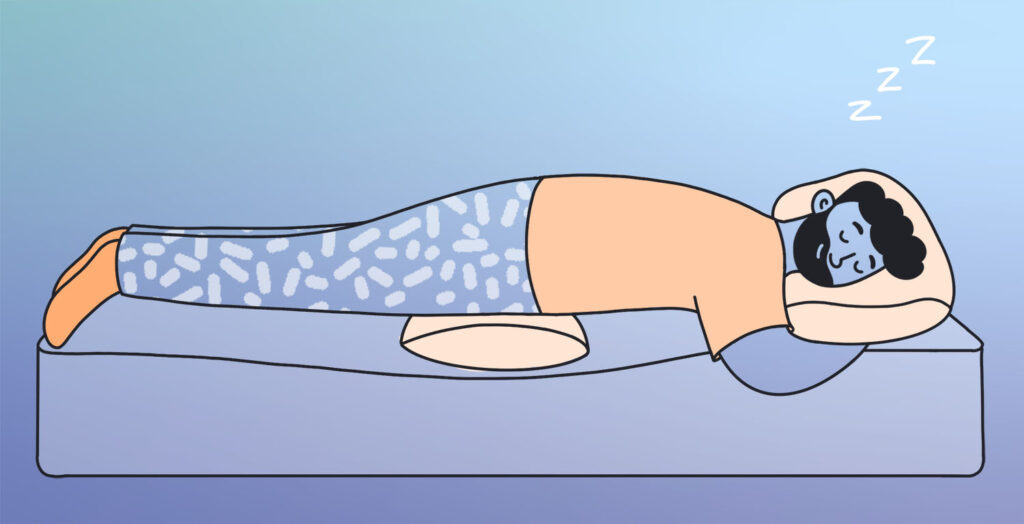If you suffer from back pain, getting a good night’s sleep can feel impossible. Back pain can make it a chore to find a comfortable sleeping position and can disrupt sleep quality. Read on to find out what causes back pain and what you can do about it.
[Editor’s Note: The content provided on this site is for general informational purposes only. Any information provided is not a substitute for professional medical advice. We encourage you to consult the appropriate health expert if you have concerns.]
Types of Back Pain
All back pain is not created equal. The location of your pain can impact what you need to do to feel better.

Middle Back
Middle back pain often arises due to poor posture, muscle imbalances, and stress. Poor ergonomics, especially during prolonged sitting or heavy lifting, can strain the muscles and ligaments in the middle back region.
Lower Back and Sciatica
Low back pain and sciatica often arise from herniated discs, spinal stenosis, or muscle strains. Sciatica results explicitly from compression of the sciatic nerve, causing radiating pain down the leg. Individuals who frequently engage in heavy lifting, have poor posture, or experience age-related changes in the spine are more susceptible. While low back pain can affect people across various demographics, sciatica tends to be more prevalent in individuals aged 30-50 and during pregnancy.
What Causes Back Pain
For some, the reason is obvious as to why they are experiencing back pain. For others, back pain might have occurred gradually over time so they can’t pinpoint an exact source. Others might have had back pain appear literally overnight. Here’s a quick list of the potential causes of back pain:
- Injury
- Spinal misalignment from your sleeping position
- Age
- Fibromyalgia
I should note, this should not be used as a way to diagnose yourself, and if you are concerned, please consult your medical provider.
How Back Pain Impacts Sleep
Back pain can significantly disrupt sleep patterns, decreasing sleep quality and duration. A 2022 study found that individuals with chronic back pain often experience the following:
- Difficulties falling and staying asleep
- Inability to achieve restorative sleep
The study concluded that as this continues, it creates a cycle of pain and poor sleep that worsens both conditions.
What Is the Best Sleeping Position for Back Pain?
Finding the best sleeping position for back pain can vary depending on the individual and the type of back pain experienced. However, some general guidelines can help alleviate discomfort and promote better sleep.
Back Sleepers
For back sleepers, placing a pillow or rolled-up towel under the knees can help maintain the spine’s natural curvature. This reduces strain on the lower back and promotes proper spinal alignment. Additionally, using a supportive pillow that cradles the neck and supports its natural curve can help alleviate neck and shoulder pain.
Side Sleepers
Side sleepers with back pain may want to try sleeping with a pillow between their knees. This helps align the hips, pelvis, and spine, reducing pressure on the lower back. It is also important to use a supportive pillow that keeps the head and neck in a neutral position to prevent strain.

Some side sleepers may find back pain relief by sleeping in a curled up, or fetal position. Doing this, in combination with a pillow between your legs, helps with alignment, but the curled position helps open the space between your vertebrae, which helps remove pressure from your back.
Stomach Sleepers
Sleeping on the stomach is generally not recommended for those with back pain, as it can strain the neck and spine. However, if you’re someone who cannot fall asleep unless you’re on your stomach, placing a thin pillow under the hips can help you maintain the proper spinal alignment.

Alternatively, you can opt for a firm mattress, which keeps your hips from sinking very far into the mattress. With hips elevated, there’s less strain on your lower back, which could help alleviate pain.
How to Sleep with Back Pain
Modifying sleep positions, optimizing your sleep space, and embracing relaxation practices can enhance sleep quality and alleviate back discomfort.
Find the Right Mattress for You
Choosing the right mattress can make a significant difference in managing back pain and improving sleep quality. The best mattress for back pain provides adequate support and comfort for your specific needs. Medium-firm mattresses are generally recommended for those with back pain, as they offer support and cushioning.
Support with Pillows
In addition to mattresses, pillows can provide extra support and alleviate back pain. As mentioned, placing a pillow under or between the knees, or under the hips, can help maintain proper spinal alignment while sleeping. Additionally, using a pillow that supports the neck’s natural curvature and keeps it aligned with the spine can reduce neck and shoulder pain.

Supplement with Heat or Cold Therapy
Heat and cold therapy can provide temporary relief from back pain. Using a heated blanket or taking a warm bath before bed can help relax the muscles and reduce pain. Alternatively, a cold pack wrapped in a thin towel can help numb the area and reduce inflammation. Experiment with heat and cold therapy to see which works best for you.
Take Medication
Over-the-counter and natural pain medications can help manage back pain and improve sleep. Nonsteroidal anti-inflammatory drugs (NSAIDs), such as ibuprofen, can reduce pain and inflammation. Natural remedies such as ginger can also reduce inflammation. However, it is important to consult with a healthcare professional before taking any medication to ensure it is safe and appropriate for your condition.
How to Combat Back Pain During the Day
Back pain doesn’t have to impact your sleep forever. You can do several simple things to take care of your back and reduce pain.
Stretch
Exercise, such as stretching, can help alleviate back pain and improve flexibility. Incorporate gentle stretching exercises into your daily routine to relieve muscle tension and promote a healthy spine. Focus on stretches that target the back, hips, and hamstrings. Remember to warm up with stretching and avoid any movements in your workout or physical activity that cause pain or discomfort.

Practice a Healthy Diet
Eating an anti-inflammatory diet can help manage back pain. The most famous of these is the Mediterranean diet. This diet is rich in fruits, vegetables, fish, and whole grains. Additionally, staying hydrated is important for spinal health, as the discs between the vertebrae require proper hydration to function optimally.
Practice Good Posture
Maintaining good posture throughout the day helps prevent and manage back pain. Avoid slouching or hunching over, especially when sitting for long periods. Use ergonomic chairs or cushions that provide lumbar support to promote proper spinal alignment.
Seek Medical Help
If back pain persists or worsens despite self-care measures, it is important to seek medical help. A healthcare professional can evaluate your condition and recommend appropriate treatment options. This may include physical therapy, chiropractic care or other interventions tailored to your needs.
FAQs
Can sleeping on your side cause back pain?
Sleeping on your side can sometimes lead to back pain, mainly if the body is not correctly aligned. Placing a pillow between your knees and sleeping on a supportive mattress can help you maintain the proper spine alignment and reduce discomfort.
How can I relieve back pain during pregnancy while sleeping?
Try to find a comfortable sleep position that supports the spine. Consider using pillows to support your back, hips, and knees. Opting for a firm mattress and utilizing pregnancy pillows can help maintain proper alignment and ease pressure on the lower back.
Can sleeping on your stomach cause back pain?
Yes, sleeping on your stomach can lead to back pain. This position can strain the neck and lower back due to the unnatural spine alignment. Choosing alternative sleep positions that provide better support and alignment for the spine is advisable.
Does sleeping on the floor help with back pain?
Sleeping on the floor may offer temporary relief for some back pain sufferers due to the firmer and more supportive surface it provides. However, individual comfort and preferences should be taken into account
The Takeaway
Sleeping with back pain can be challenging, but with the right strategies and support, it is possible to achieve restful sleep. Adopting the best sleeping positions, choosing a supportive mattress, strategically using pillows, and implementing self-care measures during the day can significantly improve sleep quality and manage back pain.
